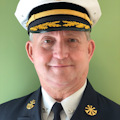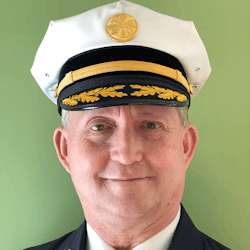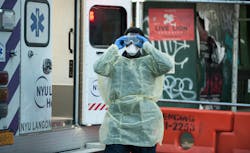Dale Carnegie stated, “Most of the important things in the world have been accomplished by people who have kept on trying when there seemed to be no hope at all.” First responders prove every day how genuine this statement is.
Over the past several months, emergency responders have launched an effort to help to mitigate a horrific virus that can sicken or kill those who are exposed. These pre-hospital personnel put their own life in harm’s way. Just as in any other adventure that first responders have faced, we all will stand together strong to respond to help our communities, to save lives and to make a difference. Just like all previous adventures or challenges, EMS will survive and carry on.
Adversity won’t defeat us
EMS plays a vital role in requests for aid, often being the first line of defense against the spread of any infectious disease. Compared with the controlled environment of a healthcare facility, care and transport by EMS present unique challenges because of the nature of the setting, the enclosed space, the frequent need for rapid medical decision-making and providing care with unconfirmed medical information. COVID-19, which is highly contagious, is spread by people. When symptoms are exhibited, they can include fever, dry cough and difficulty breathing. However, the Centers for Disease Control and Prevention (CDC) says the virus might spread before people show warning signs.
Many first responders have worked and survived previous scares, such as hepatitis, Ebola, SARS, influenza and even the anthrax scare after 9/11. Receiving vaccinations, education and equipment, and bolstered by the true faith of carrying on the mission of helping others, first responders have taken on challenges and moved forward. First responders overcame adversity, and this situation won’t conclude any differently.Always and forever
Rightfully, responders are concerned about exposing colleagues and their families. Using proper PPE and following protocols reduce the risk of becoming contaminated and ill, and social distancing (staying six feet apart from each other) is the new buzzword. But how do EMS, firefighters and police officers do this while working in confined spaces, such as a station or a response vehicle? (A lot of first responders have resorted to sleeping in their personal vehicles to avoid exposing others, including their families.)
A paramedic for the Philadelphia Fire Department, who has a pre-existing immune system challenge, felt fatigued on the second day of his tour. Half-way through the shift, he became febrile and nauseous, and he lost his appetite. The next day, he tested positive for the coronavirus, and his fever spiked to 101 degrees. He developed a dry cough and slight shortness of breath on exertion, and he lost both his sense of smell and taste. He was quarantined for two weeks, and, as of this writing, he is getting stronger every day. Yes, he was a little nervous about returning to the street, worrying about the asymptomatic patient, but he remained faithful and steadfast.
The CDC has posted differential signs concerning COVID-19. Usually the virus enters the body through the mouth, and it can sit there for several days before it makes its way into the lungs. Taking Vitamins C and D3, drinking warm fluids and gargling can help to defend against coronavirus. Washing or sanitizing your hands and not touching your face is your best defense. Don’t smoke or vape. Wearing gloves, eye protection and approved masks that filter viruses, including N95, go a long way. Decontaminating your clothes and surfaces, particularly those that are metal, is extremely important. Don’t wear your work clothes/shoes home. If you develop a dry cough, fever or shortness of breath, seek medical help immediately. New treatments show excellent promise, so the earlier the diagnosis, the better.
In New York City and other places, particularly on the East Coast, there has been an increase of providers calling off sick. Not all have tested positive for COVID-19. Increased call volume, along with the shortage of workforce and PPE, is straining many services. FEMA recently responded by sending 200 additional ambulances and 500 providers to New York City to help with the increased caseloads and conditions.
Too many don’t understand the selfless dedication and service that EMS, firefighters and police officers provide to their communities. President John F. Kennedy’s father, Joseph P. Kennedy (or was it Knute Rockne) said it best: “When the going gets tough, the tough get going.” Just as in any emergent incident, scene safety is paramount. So, watch out and support each other and wear appropriate PPE. Neither famous athletes nor Hollywood’s elite can stand in your shoes. The hard-working men and women who serve as first responders are this country’s front lines, brave souls and true heroes. As in the past, we will become stronger, working as a team, holding the line, doing whatever that’s required to help to save lives, as we wait to see what the future holds.
We are essential personnel who answer the call every day, no matter the circumstances. Stay strong and vigilant. The country is indebted to you for your sacrifice, strength, effort and service.
Open Letter from Paramedic Battling COVID-19 Pandemic
Editor’s note: A veteran EMS responder and educator from Pennsylvania wrote this open letter with Firehouse to share his anxiety while offering hope and support during the COVID-19 pandemic.
April 7, 2020
W hen this all started, I wouldn’t say I was in denial, but perhaps I downplayed it a bit to myself. Weeks continued to go on and I finally realized that I was ready and strong enough and finally figured out what I was feeling.
I am anxious! I am mentally exhausted! Each shift I am ungodly anxious as I await the next patient to take care of. I have no doubt that many healthcare and emergency services workers feel the same.
See, we have all become a victim of this current pandemic in our own way. Sadly, and unfortunately, thousands and thousands have lost their lives and thousands and thousands more will continue to perish because of this. This has altered our living, our lifestyles, our family structures, financial statuses, and so much more.
Each day when the “bells” go off my heart rate immediately increases. In my mind, I ask myself, is this the call where I will acquire this disease? Is this the call that, coupled with my asthma, will kill me? It makes me anxious. My fellow emergency workers and I encounter complete strangers in their homes. We have no idea where they’ve been, who they’ve been around, and who that person has been around.
But guess what, they need us in their time of medical emergency, so therefore, we must go. I have and will continue to treat these people as I always have; with compassion and respect as my heart beats 120 times a minute along with theirs.
For my colleagues out there, we must admit that for lots of our patients we’re a bit out of sorts and lost. I have no problem standing up and saying I am. Do I sit next to them? Do I put a mask on them? Can I touch them to do these procedures? Will they cough on me? The job goes on, but in a much more responsible way.
Today, I had a patient who made me highly suspicious of having COVID-19. My partner and I took the appropriate precautions for ourselves along with the patient. He was legitimately sick, and for the duration of the transport, continuously apologized for “calling during this time.” I explained to him to never feel that way and that he truly had an emergency. His arm sat across my lap like I do for most other patients while I take their MANUAL blood pressure and start an IV. Was I anxious? HELL YES!
Less than an hour later, the very next call, going lights and sirens to this person’s aid for abdominal pain, guess what, I was anxious. She apologized through her tears and screaming in pain, for calling during this time. And again, I say, you are sick, and I’m glad I can help you. In my opinion, COVID-19 doesn’t stop us from giving this lady pain medication and Zofran for her ruptured appendix that later sent her to the operating room. We keep doing what we do!
EMS is as “front lines” as it gets, folks, and it’s no joke! My EMT, paramedic, nurse, physician, police, and firefighter colleagues need all the good thoughts they can get. This is mentally and physically whooping our asses but, anxious or not, we will be back to work tomorrow.
However, please know that we are all feeling it. Feeling “it” a lot. Some still don’t even know what “it” is. But for me, “it” is anxiety and mental exhaustion. I’m proud of my profession and my colleagues and we will continue to drive on through this.
Be safe and be well.
Scott Henley
About the Author

Richard Bossert
Richard Bossert is a retired operations chief for the Philadelphia Fire Department. He started in the fire/rescue services in 1970, volunteering for the Warminster, PA, Fire Department. He worked for three career fire departments: Chester, Bensalem and Philadelphia. Bossert became a certified EMT in 1973, then paramedic in 1980. He received a bachelor’s degree in pre-med from Pennsylvania State University in 1977 and a master’s degree in public safety administration from St. Joseph’s University in 2003.

